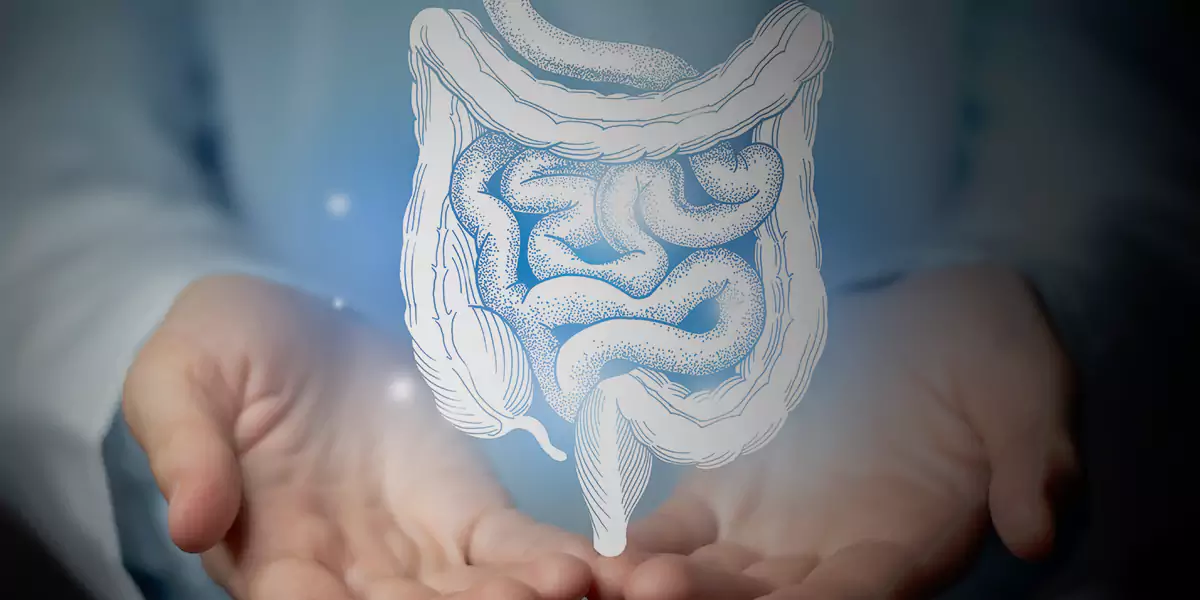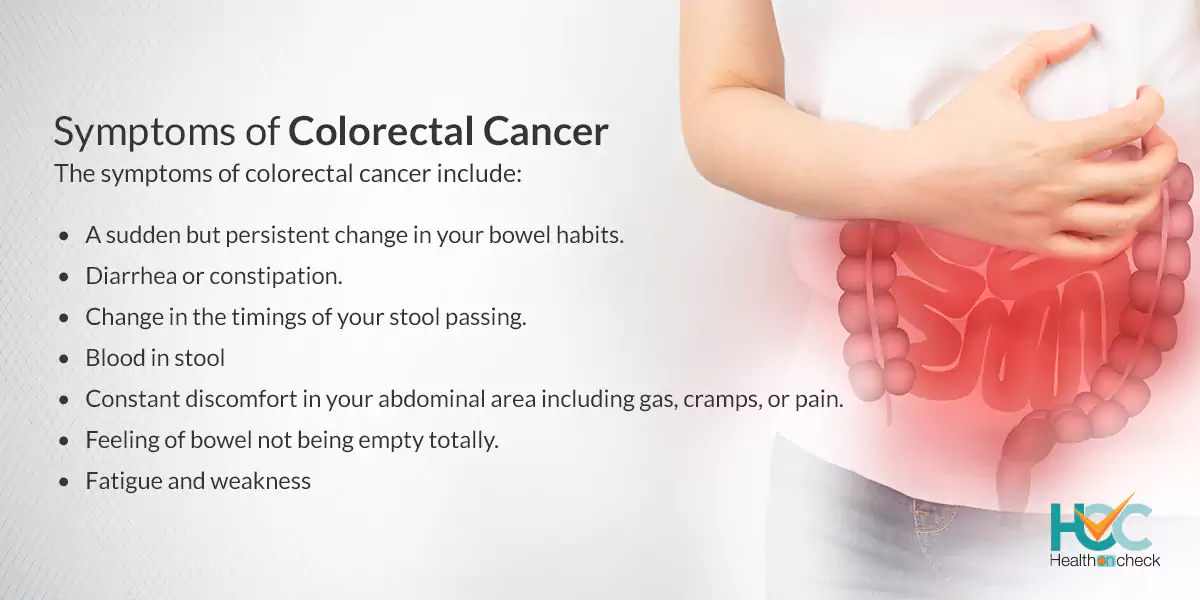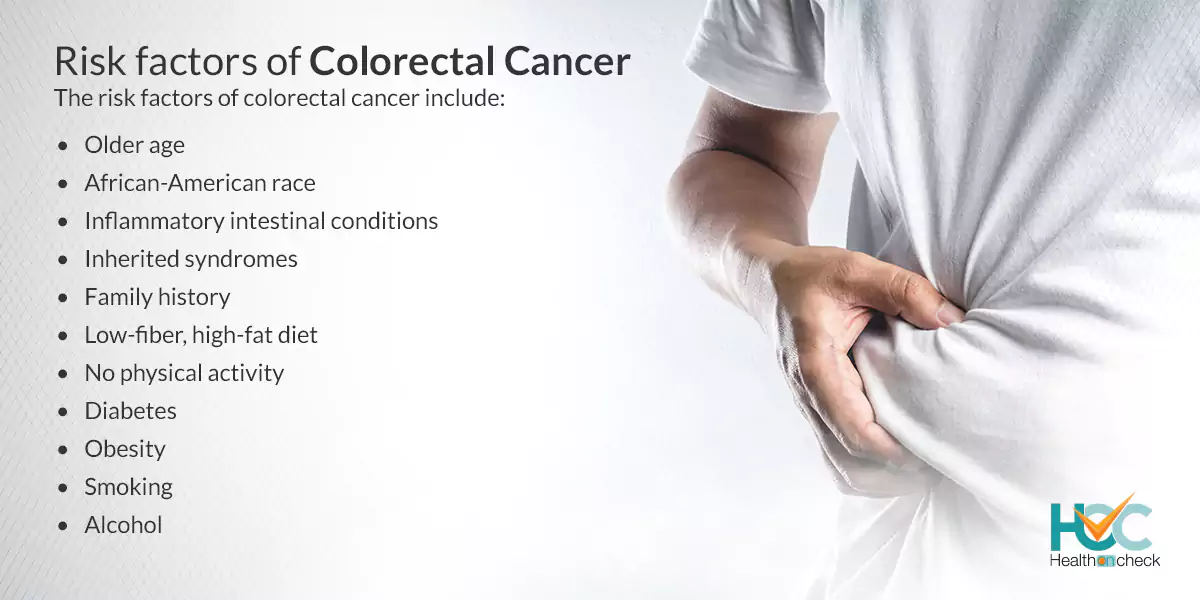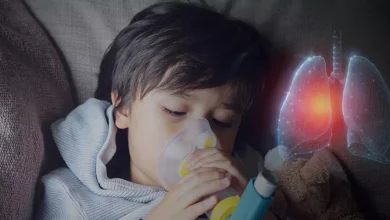All about Colorectal Cancer?

What is Colorectal Cancer?
Colorectal cancer, also known as colon cancer and rectal cancer, occurs in the large intestine (colon), which is the ending part of the digestive system. The early signs of colorectal cancer include blood in stool, diarrhea, or constipation. Though people of any age can get this type of cancer but it’s more common in older adults. Colorectal cancer typically develops as small, noncancerous (benign) clumps of cells known as polyps and it forms inside of the colon. Over a period of time, a few of these polyps can develop into colon cancers. If it’s not detected in the early stages, then it may spread to other body parts. With the development of medical science, the treatment of colorectal cancer is possible through medication. radiation therapy, or surgery and be totally cured.
What are the Types of Colorectal Cancer?
Colorectal cancer itself is a type of cancer and there are no subtypes of this type of cancer but there are five stages of colorectal cancer. Three of the four stages have three sub-stages. The system of stages of colorectal cancer is as follows:
Stage 0: This stage is called carcinoma in situ. In this stage there are abnormal or precancerous cells in your mucosa, the innermost layer of your colon wall.
Stage I: In this stage, colorectal cancer has spread into the wall of your intestine but stopped at the muscular coat or into close lymph nodes.
Stage II: In this stage, the cancer has spread into the wall of your intestine but hasn’t reached the adjacent lymph nodes yet.
There are three types of Stage II colon cancer including:
Stage IIA: Cancer has reached into a large part of your colon wall but hasn’t spread into the wall’s outer layer.
Stage IIB: The cancer reached into the outer layer of your colon wall or through the wall.
Stage IIC: Cancer has spread to a neighbouring organ.
Stage III: Here, colon cancer reached your lymph nodes. Just like Stage II colon cancer, there are three sub-stages of Stage III colon cancer such as:
Stage IIIA: Cancer has grown in the first or second layers of your colon wall and reached one to four lymph nodes.
Stage IIIB: More layers of your colon wall are affected but only affects one to three lymph nodes. Cancer has affected a few colon wall layers but has spread to four or more lymph.
Stage IIIC: The cancer has grown in the outer layer or the next outermost layer of your colon and four or more lymph nodes. Cancer has spread into an adjacent organ and one or more lymph nodes is also a stage IIIC colon cancer.
Stage IV: At this stage, the cancer has metastasized to other areas of your body, like your liver, lungs, or ovaries.
Stage IVA: Now the cancer has reached one organ or lymph nodes that are at some distance from your colon.
Stage IVB: The cancer has spread to one more distant organ and lymph nodes.
Stage IVC: At this stage, the cancer starts affecting distant organs, lymph nodes, and abdominal tissue.

What are the Symptoms of Colorectal Cancer?
The symptoms of colorectal cancer include:
- A sudden but persistent change in your bowel habits.
- Diarrhea or constipation.
- Change in the timings of your stool passing.
- Blood in stool
- Constant discomfort in your abdominal area including gas, cramps, or pain.
- Feeling of bowel not being empty totally.
- Fatigue and weakness
- Unexplained weight loss
- Vomiting
- Shortness of breath
What are the Causes of Colorectal Cancer?
Like all other types of cancers, colorectal cancer happens because of the growth of cells and when cells start to divide uncontrollably.
Researchers are not sure why and how colorectal cancer occurs but generally, it happens when the healthy cells in the colon area start to mutate in their DNA. The cells of the DNA give instructions to the cell what to do but in this case, the cells start to divide abnormally even when new cells are not needed. When the cells begin to accumulate, a tumor forms.
With passing time, the uncontrolled cancer cells start to attack and damage the adjacent normal and healthy tissues. These cancerous cells then spread to other areas of the body to grow deposits there, a condition known as metastasis and this is how colorectal cancer develops in a person.

What are the Risk Factors of Colorectal Cancer?
The risk factors of colorectal cancer include:
Older age: Though people of any age can develop colorectal cancer, but a big percentage of people with colorectal cancer are above the age of 50.
African-American race: People of African-American race have a higher chance of developing colorectal cancer than people of other races.
Inflammatory intestinal conditions: Chronic inflammatory diseases like ulcerative colitis and Crohn’s disease increase the risk of developing colorectal cancer.
Inherited syndromes: A few gene mutations which are passed through generations of your family increase the risk of colorectal cancer notably though it’s only a small percentage.
Family history: Your chances of developing colorectal cancer increase if you have a close relative who has this cancer.
Low-fiber, high-fat diet: Colorectal cancer might be linked to a diet with low fiber and high fat and calories. People who eat diets high in red meat and processed meat are more prone to colorectal cancer.
No physical activity: People who don’t do any kind of physical activity and lay ideal most of the time have more chances of developing colorectal cancer.
Diabetes: Diabetes patients have an increased risk of colorectal cancer.
Obesity: Obese people are at high risk of colorectal cancer and dying from it as compared with people of normal weight.
Smoking: Smoking tobacco increases the risk of colorectal cancer.
Alcohol: Drinking high amounts of alcohol regularly increases your risk of colorectal cancer.
Radiation therapy for cancer: If you went through radiation therapy directed at the abdomen to treat previous cancers then your risk of developing colorectal cancer increases.
What are the Complications of Colorectal Cancer?
Some possible complications of colorectal cancer include:
Iron Deficiency Anemia: Iron deficiency anemia may occur because of microscopic bleeding from a tumor.
Jaundice: Jaundice is another complication of colorectal cancer when the cancer spreads to the liver.
– Bowel Obstruction
Colorectal cancer can lead to obstruction of bowel movements and solids, liquids, and even gas might be blocked from passing through the colon. It can cause painful stomach cramps, bloating, constipation, nausea, and/or vomiting.
– A second primary colorectal cancer might develop.
– Cancer may spread to other tissues and organs.
How Colorectal Cancer is Diagnosed?
There are various cancer screening tests available to diagnose colorectal cancer including:
Fecal immunochemical test (FIT): This test helps to find the hidden blood in your stool. Samples of your stool are taken and tested in the lab
to detect blood with a microscope that might not be visible to the naked eye.
Guaiac-based fecal occult blood test (gFOBT): This test also detects blood in stool that might not be visible to the naked eye.
Fecal DNA test: This test detects the signs of genetic mutations and blood in your stool.
Flexible sigmoidoscopy: In this test, a flexible scope called a sigmoidoscope is used to look inside your lower colon and rectum.
Virtual colonoscopy: A virtual colonoscopy is a type of X-ray that searches for polyps, tumors, and ulcers (sores) in your colon and rectum.
What are the Treatment Options Available for Colorectal Cancer?
Colorectal cancer can be treated through the following options.
Surgery: Surgery is the most common way to cure colorectal cancer. There are various types of surgeries available to treat colorectal cancer based on its location, stage, and severity including:
Polypectomy: This surgery is done during early-stage colon cancer where cancerous polyps are removed.
Partial colectomy: In this surgery, a section of your colon containing a tumor and some surrounding healthy tissue are removed. Then the healthy colon sections are reconnected using a process known as anastomosis.
Surgical resection with colostomy: The part of your colon that contains a tumor is removed just like a colotomy but the difference is that here healthy colon sections can’t be connected. Instead, colostomy is carried out where your bowel is moved to an opening in your abdominal wall and the stool is collected in a bag.
Radiofrequency ablation: Heat is used to remove the cancer cells.
Chemotherapy: Strong medicines are given during chemotherapy, mostly to shrink tumors and manage the symptoms. Chemotherapy is also given post-surgery to destroy any cancer cells that might have remained in the body and help decrease the risk of cancer recurrence.
Radiation therapy: Powerful energy sources, like X-rays and protons, are used in radiotherapy to kill cancer cells. It can also be used to shrink a huge cancer before surgery so that it can be removed easily.
Targeted therapy: Here the genes, proteins, and tissues that are aiding the cancer cells to grow and multiply are targeted and removed from the body using a type of targeted therapy known as monoclonal antibody therapy. Lab-created antibodies that attach to specific targets on cancer cells or cells that help cancer cells grow are used in this therapy. The antibodies attack and destroy the cancer cells.
Living With Colorectal Cancer
Getting diagnosed with any type of cancer can be frightening, and stressful, and colorectal cancer is no exception. You will feel constant pain, or cramps in your abdomen along with other problems. Get information about the stage of your cancer as it will help you prepare accordingly. After the treatment, if you notice changes that may indicate the cancer has come back or is spreading, then you shall contact your doctor as there are instances where the cancer has returned. With the advancement of medical science, colorectal cancer is totally curable and the survival rate is more than 90%, so after getting diagnosed with it, your treatment will begin immediately.
Whom to Consult?
If you experience any persistent symptoms of colorectal cancer like blood in stool, uncontrolled bowel movement, pain or cramp in the stomach, diarrhea, etc then consult your doctor and get yourself diagnosed. If you already have chronic inflammatory diseases like ulcerative colitis or Crohn’s disease then you shall go for regular screening tests.




